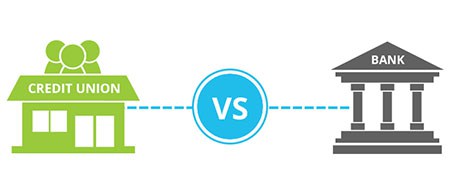We find out exactly what the differences are between credit unions and banks. Pretty interesting read!
From the outside, the services that both banks and credit unions offer are quite similar. Most of the time these services can include the following:
- Chequing accounts
- Savings accounts
- Term deposits
- Personal loans
- Home loans
- Car loans
- Debt consolidation
However, when we take a closer look at the inner workings of each type of organisations, they couldn’t be farther apart. See below for a side-by-side comparison of the differences between credit unions and banks.
| Credit Unions | Banks | |
| Owners | Each member of the credit union (each customer) is an owner of the organisation. One vote is assigned to the member regardless of how much money they have deposited. | Banks are normally controlled and owned by stockholders. One vote is assigned to each share. Customers do not have voting rights. |
| Customers | If someone deposits money into a credit union however, they are called member, and follow on to become a part owner of the company. | People who make deposits into banks, are called their customers. Depositing this money into the bank does not provide the customer with any ownership rights. |
| Board | Board member are volunteers of the community. | Board members are supposed to be selected by the shareholders. These are very well paid positions. |
| Demographic | Credit Unions are normally solely built for and to serve the interests of its own members. | Banks are normally completely open to the public. Anyone is welcome to walk into a branch and conduct business with them. |
| Profits | These organisation operate as not-for-profit. Earnings are directly paid back to the members in the form of higher savings rates or reductions on interest rates for any outstanding loans. | Banks are completely for-profit organisations. Any earnings may be paid out shareholders in the form of dividends or other various methods. |
| Products | Individual members and citizens are targeted. Services are focused on savings accounts and member loans. | Preference goes to commercial accounts in which the banks are able to produce the majority of their revenue. |
There you have it! An easy to read comparison of all the major differences between the banks and the credit unions in New Zealand.
Click here if you’d like to see all the banks currently operating in New Zealand.















